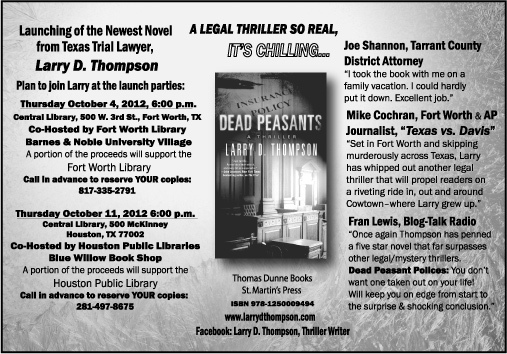Kenneth Atchity's Blog, page 228
September 19, 2012
Nadine Maritz of My Addiction Interviews Ken About The Story Merchant
Interview - Kenneth Atchity the American Story Merchant
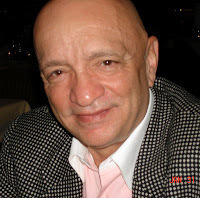
Kenneth Atchity is an American producer and
Author who has worked as a literary manager, editor, speaker, writing coach,
brand consultant and professor of comparative literature. He’s been called the
story merchant.
He is the captain of ships such as www.storymerchant.com ; Atchity
Entertainment International, inc (www.aeionline.com
); The Writers Lifeline, Inc (www.thewriterslifeline.com
) and The Louisiana Wave Studio which together produce films and develop books
for publication, screenplays, and films
for television and cinema--and consult with writers about their career
strategies and tactics.
In this interview we are aiming to discover more about
Kenneth himself and the world he lives in. As per the first interview http://ow.ly/dx211 which was
based on the launching of the Messiah Matrix – we are enormously grateful for
Kenneth to stand off his time for a written interview.
Kenneth, your entertainment career started
in 1967 and is still flourishing can you tell our readers a bit more about your
journey?
My
journey has been a rollicking literary adventure, from my days as a professor
at Occidental College and the University of Bologna, Italy, to the decision I
made to leave the academic world and enter the commercial world of
storytelling. There’s literally never been a dull moment—and the one thread
that weaves through it all is my passion for stories of all kinds. I’ve been a
first-hand witness to the world’s hunger for stories, and privileged to be able
to bring them to their audiences.
You are known for producing filmography
such as “The Lost Valentine,” “Life or
Something Like It,” “14 Days with Alzheimers,” “Hysteria,” “The Expatriate,”
and “The Kennedy Detail,” which is but a few. What do you feel has been your
best work in the filmography range?
Much
as I love the movies I’ve been lucky enough to work on, I feel my best work is
yet to come.
You founded Story Merchant for strategic
coaching in writers in 2010. What inspired the idea behind these two new
divisions?
I
founded Story Merchant because the world of publishing and entertainment has
changed so much in the last few years I found I was unable to spend time with
individual writers in a way that made business sense—and Story Merchant allows
me to do that through its (1) coaching services; (b) its publishing arm, Story
Merchant Books; and its marketing arm, Story Merchant Book Marketing. We began
(c), with my partner a former head of Fox Family Films, because the number one
challenge of any author publishing a new book is how to make it VISIBLE in a
world where thousands of books are published every single week. VISIBILITY is
the published writer’s biggest challenge, so SMBM is focused on making writers visible.
Your academic career started in 1970 up to
1986 where you received the Faculty Achievement Award and the Distinguished
Instructor at UCLA Writers program. How did you accomplish such awards within
the same year?
You
don’t really achieve awards—you just do your thing, and they either come or
not. For people who love what they do, it’s not the awards that motivate it’s
the privilege of getting to do what you love on a daily basis. It’s nice to be
recognized, but an authorpreneur needs to be self-motivated because there’s a
long wait between moments of recognition.
Your work has appeared in numerous journals
and newspapers such as the American Quarterly, Classical Philology, Comparative
Literature Studies, Contemporary Literature Criticism etc – how does it feel to
be seen as such a popular and sought after writer?
It
feels great to do the work of writing—the research, the composition, the
revision. The more you publish the more you will publish. And it’s very
satisfying to look back down a long road and see that many of my dreams—and
those of my clients and partners--reached fruition.
You have written books such as : How to Publish Your Novel (SquareOne) (2005); How to Quit Your Day
Job and Live Out Your Dreams
(Skyhorse) (2012), plus Writing Treatments That Sell: How to Create
and Market Your Story Ideas to the Motion Picture and TV Industry (Owl Books, 2003) and Write Time
(2012, available through amazon.com).
How has exposure been on these books?
It grows over the
years. It’s nice to know that several of the books have been through several
editions and continue to resonate with writers year after year. It’s an
extension of my years in the classroom to reach out and help people accelerate
their progress along the success curve.
Have readers ever given you input on how it has assisted them with their career
requirements and goals?
I couldn’t have
written any of these books without constant input from students and clients
along the way. It’s their experiences, in failure and success, that I describe
in these books.

Your companies - Atchity Entertainment International, Story
Merchant, and The Writer's Lifeline have been responsible for launching
numerous books and films. I mean the list of stuff you have done is never
ending, where to from here?
If
I’m lucky enough to continue, I will continue pushing forward the projects I’m
involved with—both my own personal projects like my first novel The Messiah
Matrix which we talked about here earlier, and the many projects of my
clients—wonderful books, screenplays, and stories that are just waiting their
turn to see the light of day. And my honor and responsibility is to move them
toward the light!
Have you ever thought about stretching your
skills into countries that are not as skilled as America?
I
did experiment a few years ago with reaching out to Brazil, at the request of a
consultant from that country. I wish there were a way to do that at least in
other English-speaking countries around the world because the world I work in,
publishing and producing, is increasingly global so the principles I propound
are universal.
In 1990 you founded the editorial and
consulting company The Writer’s Lifeline, Inc. I am told that this company has
been responsible for over a dozen best sellers. Can you tell our readers a bit
more about what the company consists of?
The
Writers Lifeline, consisting of select editors I’ve chosen over the years to
work with clients, is all about bringing “a writer’s skill and craft to the
level of their vision and ambition.” On one hand, we ghost-write stories and
information that the author needs put into the world; but on the other, our
primary mission, is we make books and scripts ready for publication and
production by giving them the conceptual, structural, style, and copy editing
they need to stand out as professionally worthy of commercial acceptance.
You also do a lot of television, radio, web
and television interviews and classes on contemporary literature, creativity, dreams,
myth, writing, producing, publishing, time-management, business expansion,
brand launching, and various other academic and entertainment-publishing
subjects.
Where do
you see yourself going with all of this within the future?
I
am consolidating more and more of this into Story Merchant Book Marketing so
that I can buy the time to help writers more. Writers need to remember the
simple arithmetic, money buys time (that’s what the saying “Time is money” is
all about). We all want unlimited freedom to create, so that means we need to
achieve unlimited financial reward for the fruits of our creation. Anything I
can do to concentrate and streamline my time helps me get more stories into the
world.
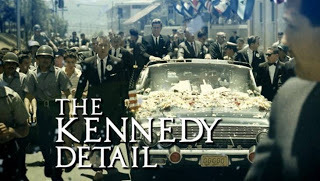
In 2011 you were nominated for the Emmy for
Outstanding Achievement in the Field of Documentary Programs on The Kennedy Detail
– this was shown on Discovery Channel last year. And now you’ve turned the same
book into a feature film, currently being written by director Stephen
Gyllenhaal that will be released in 2013..
What do you expect to see from viewers on
this release?
I
know we will see respect for the amazing men who served President Kennedy even
at the moment of this death—and had to endure the pain of it, and then go on
with their work of attempting to protect the next president, and to move the
country forward despite tragedy. I’ve seen that respect pouring out throughout
the book tour for The Kennedy Detail and in the television audience’s reaction
to the documentary—so I know the feature audience will express it as well.
How did it feel to be nominated for such an
award?
It
felt surreal to be in the room with the icons of television news and get to
meet some of them at the pre- and after-party. There’s something so ‘arbitrary’
about awards and nominations—as I said earlier, you just do your work and focus
on it, and sometimes it’s recognized. The recognition is time-consuming—I could
be at my phone working on future deals. But it’s good to pause for them, take a
breath, and put it all in perspective. There are SO MANY wonderful people
working in publishing, television, and film that just being in the same room
with them makes you realize that dreaming is the foundation for the reality we
all live in. I got to be in the room with fellow dreamers. That’s like dying
and going to heaven!
South Africa seems to be a country that holds
a lot of promise in many things. Filmography and publishing are but some of its
lesser opportunities.
How do you perceive these two factors to
grow in the future?
As
the world continues to shrink thanks to the technologies and the internet, film
and publishing will grow in all parts of the world. I’ve been offered to
amazing South African projects in the last two months, and there are many out
there being dreamed at this very moment—persistence will turn them into
realities.
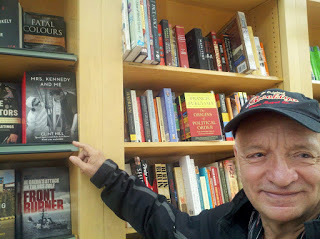
For someone like me – Hollywood and big
novel publishing brands seems to be something that is not easy to come by. It’s
as if success is mostly concluded through the people you know and the money you
could spend. Have you ever thought about branching out internationally?
I’ve
become all too aware of my limitations—primarily the limitation of the hours in
the day. The only way I could conceive of branching out further is with the
help of energetic partners who can build the infrastructure. Otherwise I’m
happy with my present base, though I have clients in South Africa, Hong Kong,
Germany, Belgium, France, England, Australia, Canada—and probably a few others
I’ve forgotten at the moment.
If someone wanted to submit a manuscript or
screenplay for your recommendation – what steps do they need to follow?
The
best way to get my attention these days is to submit it to the ‘project launch
analysis’ on www.thewriterslifeline.com
That way your project gets read, analysed, and reported back to me—for me to
take a look at if it’s ready to move forward. If it’s not ready, you’ll be told
why and we can help you do something about it.
What genres do you follow?
We
have worked in every imaginable genre. I just love GOOD STORIES of all kinds.
Which age groups are you limited to?
We
aren’t limited to any age groups. We’ve found ways to work with them all.
Where can people follow your work and
access your sites for possible submissions and enquiries?
My
personal blog is a nexus that changes daily but gives you access to all the
websites: its http://www.kenatchityblog.com/
What
do you prefer – reading, writing or screen?
I
equally prefer reading and watching movies.
These days I find that the line between
novel publishing and putting it to screen has become fairly narrow. There are
very few books I have read that hasn’t made it to film or possible future
filming.
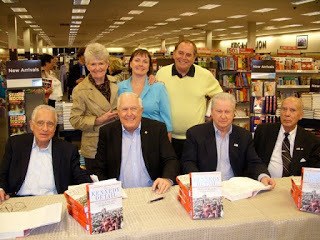
I’m
surprised because it’s my experience that the book that makes it to film is 1
in a hundred or more. Great books are the exception, but it still can take
years to get to the screen.
What is your viewpoint on such a matter?
Persist.
Do it right. Learn everything you can, especially from other people’s
experience.
What are your views when it comes to online
kindle reading and actual printed novels – do you feel that the market will
always remain for physical publishing?
I’m
sure it will remain for another 50 years, though I’m not sure it’ll be that
long. When Gutenberg invented the printing press I’m sure folks still said, “I
prefer my scroll.” But 50 years later I doubt that anyone was still making
scrolls, and few still reading from them.
Final words for striving authors and
producers around the world.
If
you have a dream, you have a responsibility to yourself and to us to make it
come true. That’s the most important thing in your life. Don’t let anything
stand in its way. And let me know if we can help you get there!
Kenneth –
thanks so much for granting me this interview.


Kenneth Atchity is an American producer and
Author who has worked as a literary manager, editor, speaker, writing coach,
brand consultant and professor of comparative literature. He’s been called the
story merchant.
He is the captain of ships such as www.storymerchant.com ; Atchity
Entertainment International, inc (www.aeionline.com
); The Writers Lifeline, Inc (www.thewriterslifeline.com
) and The Louisiana Wave Studio which together produce films and develop books
for publication, screenplays, and films
for television and cinema--and consult with writers about their career
strategies and tactics.
In this interview we are aiming to discover more about
Kenneth himself and the world he lives in. As per the first interview http://ow.ly/dx211 which was
based on the launching of the Messiah Matrix – we are enormously grateful for
Kenneth to stand off his time for a written interview.
Kenneth, your entertainment career started
in 1967 and is still flourishing can you tell our readers a bit more about your
journey?
My
journey has been a rollicking literary adventure, from my days as a professor
at Occidental College and the University of Bologna, Italy, to the decision I
made to leave the academic world and enter the commercial world of
storytelling. There’s literally never been a dull moment—and the one thread
that weaves through it all is my passion for stories of all kinds. I’ve been a
first-hand witness to the world’s hunger for stories, and privileged to be able
to bring them to their audiences.
You are known for producing filmography
such as “The Lost Valentine,” “Life or
Something Like It,” “14 Days with Alzheimers,” “Hysteria,” “The Expatriate,”
and “The Kennedy Detail,” which is but a few. What do you feel has been your
best work in the filmography range?
Much
as I love the movies I’ve been lucky enough to work on, I feel my best work is
yet to come.
You founded Story Merchant for strategic
coaching in writers in 2010. What inspired the idea behind these two new
divisions?
I
founded Story Merchant because the world of publishing and entertainment has
changed so much in the last few years I found I was unable to spend time with
individual writers in a way that made business sense—and Story Merchant allows
me to do that through its (1) coaching services; (b) its publishing arm, Story
Merchant Books; and its marketing arm, Story Merchant Book Marketing. We began
(c), with my partner a former head of Fox Family Films, because the number one
challenge of any author publishing a new book is how to make it VISIBLE in a
world where thousands of books are published every single week. VISIBILITY is
the published writer’s biggest challenge, so SMBM is focused on making writers visible.
Your academic career started in 1970 up to
1986 where you received the Faculty Achievement Award and the Distinguished
Instructor at UCLA Writers program. How did you accomplish such awards within
the same year?
You
don’t really achieve awards—you just do your thing, and they either come or
not. For people who love what they do, it’s not the awards that motivate it’s
the privilege of getting to do what you love on a daily basis. It’s nice to be
recognized, but an authorpreneur needs to be self-motivated because there’s a
long wait between moments of recognition.
Your work has appeared in numerous journals
and newspapers such as the American Quarterly, Classical Philology, Comparative
Literature Studies, Contemporary Literature Criticism etc – how does it feel to
be seen as such a popular and sought after writer?
It
feels great to do the work of writing—the research, the composition, the
revision. The more you publish the more you will publish. And it’s very
satisfying to look back down a long road and see that many of my dreams—and
those of my clients and partners--reached fruition.
You have written books such as : How to Publish Your Novel (SquareOne) (2005); How to Quit Your Day
Job and Live Out Your Dreams
(Skyhorse) (2012), plus Writing Treatments That Sell: How to Create
and Market Your Story Ideas to the Motion Picture and TV Industry (Owl Books, 2003) and Write Time
(2012, available through amazon.com).
How has exposure been on these books?
It grows over the
years. It’s nice to know that several of the books have been through several
editions and continue to resonate with writers year after year. It’s an
extension of my years in the classroom to reach out and help people accelerate
their progress along the success curve.
Have readers ever given you input on how it has assisted them with their career
requirements and goals?
I couldn’t have
written any of these books without constant input from students and clients
along the way. It’s their experiences, in failure and success, that I describe
in these books.

Your companies - Atchity Entertainment International, Story
Merchant, and The Writer's Lifeline have been responsible for launching
numerous books and films. I mean the list of stuff you have done is never
ending, where to from here?
If
I’m lucky enough to continue, I will continue pushing forward the projects I’m
involved with—both my own personal projects like my first novel The Messiah
Matrix which we talked about here earlier, and the many projects of my
clients—wonderful books, screenplays, and stories that are just waiting their
turn to see the light of day. And my honor and responsibility is to move them
toward the light!
Have you ever thought about stretching your
skills into countries that are not as skilled as America?
I
did experiment a few years ago with reaching out to Brazil, at the request of a
consultant from that country. I wish there were a way to do that at least in
other English-speaking countries around the world because the world I work in,
publishing and producing, is increasingly global so the principles I propound
are universal.
In 1990 you founded the editorial and
consulting company The Writer’s Lifeline, Inc. I am told that this company has
been responsible for over a dozen best sellers. Can you tell our readers a bit
more about what the company consists of?
The
Writers Lifeline, consisting of select editors I’ve chosen over the years to
work with clients, is all about bringing “a writer’s skill and craft to the
level of their vision and ambition.” On one hand, we ghost-write stories and
information that the author needs put into the world; but on the other, our
primary mission, is we make books and scripts ready for publication and
production by giving them the conceptual, structural, style, and copy editing
they need to stand out as professionally worthy of commercial acceptance.
You also do a lot of television, radio, web
and television interviews and classes on contemporary literature, creativity, dreams,
myth, writing, producing, publishing, time-management, business expansion,
brand launching, and various other academic and entertainment-publishing
subjects.
Where do
you see yourself going with all of this within the future?
I
am consolidating more and more of this into Story Merchant Book Marketing so
that I can buy the time to help writers more. Writers need to remember the
simple arithmetic, money buys time (that’s what the saying “Time is money” is
all about). We all want unlimited freedom to create, so that means we need to
achieve unlimited financial reward for the fruits of our creation. Anything I
can do to concentrate and streamline my time helps me get more stories into the
world.

In 2011 you were nominated for the Emmy for
Outstanding Achievement in the Field of Documentary Programs on The Kennedy Detail
– this was shown on Discovery Channel last year. And now you’ve turned the same
book into a feature film, currently being written by director Stephen
Gyllenhaal that will be released in 2013..
What do you expect to see from viewers on
this release?
I
know we will see respect for the amazing men who served President Kennedy even
at the moment of this death—and had to endure the pain of it, and then go on
with their work of attempting to protect the next president, and to move the
country forward despite tragedy. I’ve seen that respect pouring out throughout
the book tour for The Kennedy Detail and in the television audience’s reaction
to the documentary—so I know the feature audience will express it as well.
How did it feel to be nominated for such an
award?
It
felt surreal to be in the room with the icons of television news and get to
meet some of them at the pre- and after-party. There’s something so ‘arbitrary’
about awards and nominations—as I said earlier, you just do your work and focus
on it, and sometimes it’s recognized. The recognition is time-consuming—I could
be at my phone working on future deals. But it’s good to pause for them, take a
breath, and put it all in perspective. There are SO MANY wonderful people
working in publishing, television, and film that just being in the same room
with them makes you realize that dreaming is the foundation for the reality we
all live in. I got to be in the room with fellow dreamers. That’s like dying
and going to heaven!
South Africa seems to be a country that holds
a lot of promise in many things. Filmography and publishing are but some of its
lesser opportunities.
How do you perceive these two factors to
grow in the future?
As
the world continues to shrink thanks to the technologies and the internet, film
and publishing will grow in all parts of the world. I’ve been offered to
amazing South African projects in the last two months, and there are many out
there being dreamed at this very moment—persistence will turn them into
realities.

For someone like me – Hollywood and big
novel publishing brands seems to be something that is not easy to come by. It’s
as if success is mostly concluded through the people you know and the money you
could spend. Have you ever thought about branching out internationally?
I’ve
become all too aware of my limitations—primarily the limitation of the hours in
the day. The only way I could conceive of branching out further is with the
help of energetic partners who can build the infrastructure. Otherwise I’m
happy with my present base, though I have clients in South Africa, Hong Kong,
Germany, Belgium, France, England, Australia, Canada—and probably a few others
I’ve forgotten at the moment.
If someone wanted to submit a manuscript or
screenplay for your recommendation – what steps do they need to follow?
The
best way to get my attention these days is to submit it to the ‘project launch
analysis’ on www.thewriterslifeline.com
That way your project gets read, analysed, and reported back to me—for me to
take a look at if it’s ready to move forward. If it’s not ready, you’ll be told
why and we can help you do something about it.
What genres do you follow?
We
have worked in every imaginable genre. I just love GOOD STORIES of all kinds.
Which age groups are you limited to?
We
aren’t limited to any age groups. We’ve found ways to work with them all.
Where can people follow your work and
access your sites for possible submissions and enquiries?
My
personal blog is a nexus that changes daily but gives you access to all the
websites: its http://www.kenatchityblog.com/
What
do you prefer – reading, writing or screen?
I
equally prefer reading and watching movies.
These days I find that the line between
novel publishing and putting it to screen has become fairly narrow. There are
very few books I have read that hasn’t made it to film or possible future
filming.

I’m
surprised because it’s my experience that the book that makes it to film is 1
in a hundred or more. Great books are the exception, but it still can take
years to get to the screen.
What is your viewpoint on such a matter?
Persist.
Do it right. Learn everything you can, especially from other people’s
experience.
What are your views when it comes to online
kindle reading and actual printed novels – do you feel that the market will
always remain for physical publishing?
I’m
sure it will remain for another 50 years, though I’m not sure it’ll be that
long. When Gutenberg invented the printing press I’m sure folks still said, “I
prefer my scroll.” But 50 years later I doubt that anyone was still making
scrolls, and few still reading from them.
Final words for striving authors and
producers around the world.
If
you have a dream, you have a responsibility to yourself and to us to make it
come true. That’s the most important thing in your life. Don’t let anything
stand in its way. And let me know if we can help you get there!
Kenneth –
thanks so much for granting me this interview.

Published on September 19, 2012 00:00
September 18, 2012
Story Merchant Client Michael Avallone's The Case of the Violent Virgin Available on Amazon Kindle!

Check out this Vintage Review From 1001 Midnights ...
A 1001 MIDNIGHTS review: MICHAEL AVALLONE – The Case of the Violent Virgin.
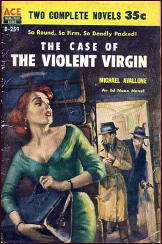 MICHAEL AVALLONE – The Case of the Violent Virgin. Bound back-to-back with The Case of the Bouncing Betty. Ace Double Ace D-259, paperback originals, 1957.
MICHAEL AVALLONE – The Case of the Violent Virgin. Bound back-to-back with The Case of the Bouncing Betty. Ace Double Ace D-259, paperback originals, 1957.Michael Avallone, who has dubbed himself “The Fastest Typewriter in the East” and “King
of the Paperbacks,” has published more than 200 novels over the past
four decades, some thirty of which feature private eye Ed Noon.
On the one hand, Noon is your standard hard-boiled,
wisecracking snoop with a taste for copious bloodletting and a
Spillane-type hatred of Communists, dissidents, counterculture types,
pacifists, militant blacks, militant women, and anyone or anything else
of a liberal or civilized cant.
On the other hand, he is a distinctly if eccentrically drawn
character whose passions include baseball, old movies, and dumb jokes, and who gets himself mixed up with some of the most improbable individuals ever committed to paper.
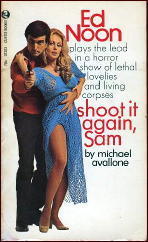 The gold-toothed, beret-wearing villain in
The Case of the Violent Virgin
,
The gold-toothed, beret-wearing villain in
The Case of the Violent Virgin
,for instance-a guy named Dean, who, like Ed Noon, is on the trail of a
six-foot marble statue called the Violent Virgin, “The Number One Nude,”
not to mention one of the world’s most precious stones, the “Blue
Green.”
Dean is a very well-spoken fellow; at one point in the
narrative, he says to Noon, “Your precipitous exodus from serene
sanctuary propels me toward Brobdingnagian measures. Spider and I mourn
for your misdemeanors but your palpitating perignations [sic] induce no
termination of our grief.”
Spider, who is Dean’s accomplice in crime, is not nearly so
well spoken; he says things like “Okay, Dad. Make the parley with them.
But fast. This choo-choo could get too hot for us.”
The “choo-choo” he is referring to is the Mainliner, which
travels from New York’s Grand Central Station to Chicago. Noon is on it
because he has been hired to bodyguard a woman named Opal Trace (who
doesn’t speak her words, she “carols” and “musicales” them).
And what a train ride it is, chockablock full of a mixed-up
mish-mash of double-dealing, multiple murder, vicious dogs, shootouts, a
bomb explosion, and, to cap things off, a rousing derailment. None of
it makes much sense — but then, one doesn’t read Avallone looking for
sense.
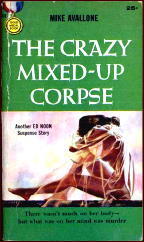 What one does read Avallone for, primarily, is his lurid,
What one does read Avallone for, primarily, is his lurid, bizarre, and often hilarious prose style. Noonisms — as his better
similes, metaphors, and descriptive passages have come to be called —
abound in The Case of the Violent Virgin ; there are more to the chapter, in fact, than in just about any other Ed Noon adventure.
A sample: “Her hips were beautifully arched and her breasts
were like proud flags waving triumphantly. She carried them high and
mighty.” And: “I flung a quick glance through the soot-stained windows. A
mountain range and a dark night sky peppered with salty-looking stars
winked at me.”
Similar “palpitating perignations” can be found in such other Avallone spectaculars as The Tall Dolores (1953); The Voodoo Murders (1957); The Crazy Mixed-Up Corpse (1957); Meanwhile Back at the Morgue (1960), in which you will find the immortal line “The next day dawned bright and clear on my empty stomach”; and Shoot It Again, Sam! (1972).
———
Posted by Steve under 1001 Midnights , Reviews
Reprinted with permission from 1001 Midnights , edited by Bill Pronzini & Marcia Muller and published by The Battered Silicon Dispatch Box, 2007. Copyright © 1986, 2007 by the Pronzini-Muller Family Trust.

Published on September 18, 2012 00:00
September 17, 2012
The Cast and Crew of ‘Writers
Greg Kinnear, Nat Wolff, director Josh Boone and producer Judy Cairo stopped by our THR lounge to discuss their new drama. The script follows these multi-general lines, the high school element, the college element and all of them just resonated with me in a way that felt very truthful and I had never gotten to play an author before. Novelist.. I liked the sound of that” added Greg.
Video by: R. Laski, P. Teyssier-Verger, J. Laski, C. Smith, J. Kooistra, C. Austin, O. Pratten, S. Wilson, G. Kilday, M. Lizaso, N. Ali

Published on September 17, 2012 00:00
September 15, 2012
Larry D. Thompson's Dead Peasants in the Texas Bar Journal Oct. edition
Published on September 15, 2012 00:00
September 14, 2012
Larry D. Thompson's Dead Peasants in the Texas Bar Journal Oct. edition
Published on September 14, 2012 00:00
Story Merchant Client Royce Buckingham's Review of Demonkeeper Picked by Seattle PI
Book Review: Demonkeeper by Royce Buckingham
By Mandy Southgate, BLOGCRITICS.ORG
inShare
Nathaniel Grimlock is a demon keeper, taken in as a young boy to
become an apprentice to master Demon Keeper Dhaliwahl. Now Dhaliwahl is
gone, and Nat has been left behind to look after a household of demons
and to keep the demon world in order. The only problem is that Nat's
only non-demon companion is a sheep dog called Bel, and Nat has to admit
that he is lonely. What could possibly be the harm in meeting other
young people his age, in perhaps getting a girlfriend?
What could be the harm, indeed? In 's Demonkeeper,
demons are all around us. They are the manifestations of chaos in our
universe and can range from the playful and mischievous to the outright
malevolent. When Nat ventures out and meets junior librarian's assistant
Sandy, he also catches the attention of two neighbourhood boys who
break into the house and release The Beast, one of the nastiest demons
of all. Can Nat restore order and keep the girl, and most importantly,
can he do it before the Thin Man catches up with him?
[image error]Demonkeeper
is a short novel aimed at children aged 10 and up. It is laugh-out-loud
funny in places, and my favourite part of the book was when Nat
accidentally microwaved one of his demon minions (it exploded but don't
worry, the demon survived).
Nat is a fabulous character with a
dry wit and self-deprecating sense of humour. Most of all, he is a
strong character with an enormous responsibility on his shoulders who
grows from reluctant and clumsy to heroic and competent. I liked the
idea of his three demon minions as well as the Thin Man's minions.
Most of all, Demonkeeper is a cautionary tale and I really enjoyed The Beast's raison d'etre and the notion of lost children and the adults they become.
Demonkeeper
is the perfect book for reluctant readers and should appeal to both
boys and girls. It is fun, exciting and original and I am pleased to see
that it is the first in a trilogy.
I give Demonkeeper four out of five stars and will certainly continue to read this trilogy.
[image error]
Purchase Royce Buckingham's Demonkeeper at Amazon.com.
at Amazon.com.
View the original article on blogcritics.org


By Mandy Southgate, BLOGCRITICS.ORG
inShare
Nathaniel Grimlock is a demon keeper, taken in as a young boy to
become an apprentice to master Demon Keeper Dhaliwahl. Now Dhaliwahl is
gone, and Nat has been left behind to look after a household of demons
and to keep the demon world in order. The only problem is that Nat's
only non-demon companion is a sheep dog called Bel, and Nat has to admit
that he is lonely. What could possibly be the harm in meeting other
young people his age, in perhaps getting a girlfriend?
What could be the harm, indeed? In 's Demonkeeper,
demons are all around us. They are the manifestations of chaos in our
universe and can range from the playful and mischievous to the outright
malevolent. When Nat ventures out and meets junior librarian's assistant
Sandy, he also catches the attention of two neighbourhood boys who
break into the house and release The Beast, one of the nastiest demons
of all. Can Nat restore order and keep the girl, and most importantly,
can he do it before the Thin Man catches up with him?
[image error]Demonkeeper
is a short novel aimed at children aged 10 and up. It is laugh-out-loud
funny in places, and my favourite part of the book was when Nat
accidentally microwaved one of his demon minions (it exploded but don't
worry, the demon survived).
Nat is a fabulous character with a
dry wit and self-deprecating sense of humour. Most of all, he is a
strong character with an enormous responsibility on his shoulders who
grows from reluctant and clumsy to heroic and competent. I liked the
idea of his three demon minions as well as the Thin Man's minions.
Most of all, Demonkeeper is a cautionary tale and I really enjoyed The Beast's raison d'etre and the notion of lost children and the adults they become.
Demonkeeper
is the perfect book for reluctant readers and should appeal to both
boys and girls. It is fun, exciting and original and I am pleased to see
that it is the first in a trilogy.
I give Demonkeeper four out of five stars and will certainly continue to read this trilogy.
[image error]
Purchase Royce Buckingham's Demonkeeper
 at Amazon.com.
at Amazon.com.View the original article on blogcritics.org

Published on September 14, 2012 00:00
September 13, 2012
Fran Lewis Reviews Story Merchant Client Larry D. Thompson's Dead Peasants
Look for Larry on Fran Lewis' Book Discussion on BlogTalk radio October 18th
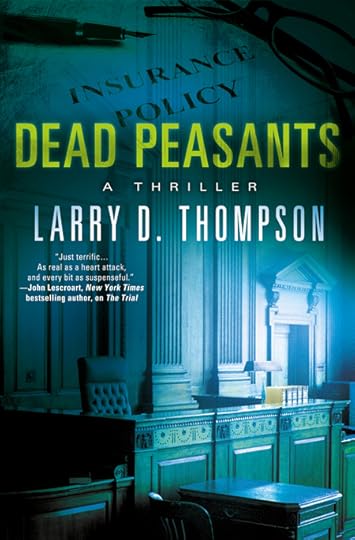
... Dead Peasants is a legal/ murder thriller that will keep you on edge from start to finish until you come to the surprise and shocking conclusion. Once again Larry D. Thompson has penned a five star novel that far surpasses other legal/mystery thrillers. Jack Bryant is a solid character who with the help of our esteemed author will enlighten readers as to why you need to be careful when working for any company: Dead Peasant Polices: You don’t want one taken out on your life!



... Dead Peasants is a legal/ murder thriller that will keep you on edge from start to finish until you come to the surprise and shocking conclusion. Once again Larry D. Thompson has penned a five star novel that far surpasses other legal/mystery thrillers. Jack Bryant is a solid character who with the help of our esteemed author will enlighten readers as to why you need to be careful when working for any company: Dead Peasant Polices: You don’t want one taken out on your life!

Published on September 13, 2012 00:00
September 11, 2012
Mrs. Kennedy and Me Featured in Santa Barbara News-Press
Bodyguard for Mrs. Kennedy - "Mrs. Kennedy and Me" Tells about his work protecting the first lady.
Click Below to View Full Article.
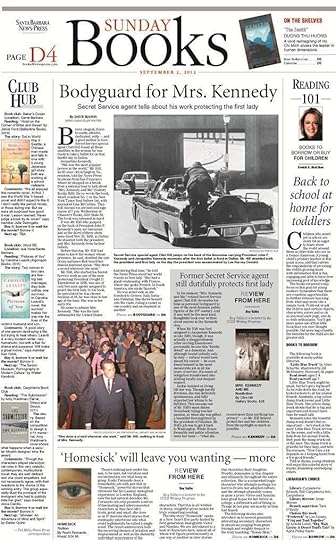


Click Below to View Full Article.


Published on September 11, 2012 13:41
PR Web Discuses the Historic Elements of Terry Stanfill's New Novel Relams of Gold.
Was the Original Camelot Actually in France?
Art expert Terry Stanfill reveals surprising historic possibility for King Arthur legend.
Los Angeles, CA (PRWEB)
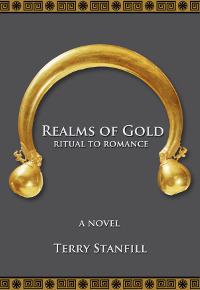
Planning already is underway to mark the 50th anniversaryof the
assassination of President John F. Kennedy on Nov. 22, 2013.
Commemorative events in Dallas and in churches across the country are
being organized. TV host Bill O’Reilly is set to release a new book,
“Killing Kennedy: The End of Camelot,” this fall, and a feature movie,
“The Kennedy Detail,” is planned for release next fall.
“As people ponder the legacy of President Kennedy and his ‘Camelot,’
it’s a good time to revisit the original Camelot of King Arthur legend,
and I have compelling new evidence about where it may have been
located,” says art expert Terry Stanfill, author of "Realms of Gold:
Ritual to Romance" (http://realmsofgoldthenovel.blogspot.com), a novel of ancient history and modern romance that posits her new theory about Camelot.
“The Arthurian legend is so ancient, and yet it has been one of the
most enduring interests in Western civilization,” she says. “It’s
exciting to think that after all of these centuries, we have a strong
case for a real Camelot.”
Educated in Medieval history, Stanfill has traveled extensively
through Asia and Europe, particularly France and Italy, and researched
the art and artifacts. She offers this primer on King Arthur, including
her own surprising theory about the true location of the original
Camelot:
The legend
Arthur as king was first mentioned in “The History of the Kings of
Britain” by Geoffrey of Monmouth, 1100-1155. A generation later,
Chrétien de Troyes, a French bard and poet, began to weave stories about
King Arthur's court, introducing the characters Lancelot, Guinevere and
Perceval. He was the first to mention Camelot, King Arthur’s home,
describing it as "a place by a river, surrounded by forests and plains
beyond."
The reality
Toward the end of the Roman Empire, circa 450 AD, Arthur Riothamus, King
of the Britons, was hired by the Romans to fight off invading Goths and
Visigoths. There is documentation from multiple sources that Arthur
spent a lot of time in Burgundy, France. He died after a battle near
Bourges and was taken by his men to Avallon in France, a town that had
existed for centuries. This is fact, not fiction.
Avalon
While many people believe the mystical Avalon of Arthurian legend was in
England, perhaps near Glastonbury, there is no record of a place called
Avalon in that country.The Avallon region of France, however, has long
existed. It was and still is known for its fruit trees and vines, much
like the lush island of legend.
Camelot
While many presume Camelot was in England, the extraordinary discovery
in 2007 of the remains of an ancient community on Mont Lassois in France
makes Stanfill wonder if this was actually the true Camelot. The
community is near Avallon, and among the buildings unearthed there
appear to be the remnants of a palace, including a great hall, where
there is evidence of feasting.
“When Chrétien de Troyes wrote of Camelot, this place may have been
held in the memory of the locals as a place where peace, prosperity and
the good life held a long reign,” Stanfill says. “His vision was a
nostalgic tribute to a distant, golden age of tranquility that was on
this hilltop.”
Stage director Manfred Flynn Kuhnert, an Arthurian legend aficionado
and teaching fellow at Harvard College, says Stanfill offers the most
compelling evidence he’s heard for the historical existence of Camelot
and its location in France.
“The citadel of Latisco on Mont Lassois -- a site of palatial
buildings unprecedented in the Celtic world – is not far from Avallon,”
Kuhnert says. “Arthur Riothamus’ time in Burgundy is documented, and we
know that the first person to write about Arthur was the bard Chrétien,
who lived in the area.
“This place is exactly as he described it: ‘on a hill, a place by a
river, surrounded by forests, with plains beyond.’ Terry Stanfill may
well have it right.”
About Terry Stanfill
Terry Stanfill holds a degree in English literature with a minor in
medieval history. She is an Overseer of the Huntington Library in San
Marino, Calif. An enthusiastic preservationist, she was decorated by the
president of Italy with the Ordine al Merito, Cavaliere della
Repubblica Italiana, and more recently as Commendatore, for her
fundraising efforts for the restoration of San Pietro di Castello, the
ancient cathedral of Venice. She is a former international
representative for Christie’s auction house and former director of
Norton Simon Museum in Pasadena, Calif. “Realms of Gold: Ritual to
Romance” is her third novel. Her first two are “The Blood Remembers” and
“A Tale of the Fortuny Gown.” Stanfill is married to Dennis Stanfill,
former CEO of 20th Century Fox and MGM Studios.

Art expert Terry Stanfill reveals surprising historic possibility for King Arthur legend.
Los Angeles, CA (PRWEB)

Planning already is underway to mark the 50th anniversaryof the
assassination of President John F. Kennedy on Nov. 22, 2013.
Commemorative events in Dallas and in churches across the country are
being organized. TV host Bill O’Reilly is set to release a new book,
“Killing Kennedy: The End of Camelot,” this fall, and a feature movie,
“The Kennedy Detail,” is planned for release next fall.
“As people ponder the legacy of President Kennedy and his ‘Camelot,’
it’s a good time to revisit the original Camelot of King Arthur legend,
and I have compelling new evidence about where it may have been
located,” says art expert Terry Stanfill, author of "Realms of Gold:
Ritual to Romance" (http://realmsofgoldthenovel.blogspot.com), a novel of ancient history and modern romance that posits her new theory about Camelot.
“The Arthurian legend is so ancient, and yet it has been one of the
most enduring interests in Western civilization,” she says. “It’s
exciting to think that after all of these centuries, we have a strong
case for a real Camelot.”
Educated in Medieval history, Stanfill has traveled extensively
through Asia and Europe, particularly France and Italy, and researched
the art and artifacts. She offers this primer on King Arthur, including
her own surprising theory about the true location of the original
Camelot:
The legend
Arthur as king was first mentioned in “The History of the Kings of
Britain” by Geoffrey of Monmouth, 1100-1155. A generation later,
Chrétien de Troyes, a French bard and poet, began to weave stories about
King Arthur's court, introducing the characters Lancelot, Guinevere and
Perceval. He was the first to mention Camelot, King Arthur’s home,
describing it as "a place by a river, surrounded by forests and plains
beyond."
The reality
Toward the end of the Roman Empire, circa 450 AD, Arthur Riothamus, King
of the Britons, was hired by the Romans to fight off invading Goths and
Visigoths. There is documentation from multiple sources that Arthur
spent a lot of time in Burgundy, France. He died after a battle near
Bourges and was taken by his men to Avallon in France, a town that had
existed for centuries. This is fact, not fiction.
Avalon
While many people believe the mystical Avalon of Arthurian legend was in
England, perhaps near Glastonbury, there is no record of a place called
Avalon in that country.The Avallon region of France, however, has long
existed. It was and still is known for its fruit trees and vines, much
like the lush island of legend.
Camelot
While many presume Camelot was in England, the extraordinary discovery
in 2007 of the remains of an ancient community on Mont Lassois in France
makes Stanfill wonder if this was actually the true Camelot. The
community is near Avallon, and among the buildings unearthed there
appear to be the remnants of a palace, including a great hall, where
there is evidence of feasting.
“When Chrétien de Troyes wrote of Camelot, this place may have been
held in the memory of the locals as a place where peace, prosperity and
the good life held a long reign,” Stanfill says. “His vision was a
nostalgic tribute to a distant, golden age of tranquility that was on
this hilltop.”
Stage director Manfred Flynn Kuhnert, an Arthurian legend aficionado
and teaching fellow at Harvard College, says Stanfill offers the most
compelling evidence he’s heard for the historical existence of Camelot
and its location in France.
“The citadel of Latisco on Mont Lassois -- a site of palatial
buildings unprecedented in the Celtic world – is not far from Avallon,”
Kuhnert says. “Arthur Riothamus’ time in Burgundy is documented, and we
know that the first person to write about Arthur was the bard Chrétien,
who lived in the area.
“This place is exactly as he described it: ‘on a hill, a place by a
river, surrounded by forests, with plains beyond.’ Terry Stanfill may
well have it right.”
About Terry Stanfill
Terry Stanfill holds a degree in English literature with a minor in
medieval history. She is an Overseer of the Huntington Library in San
Marino, Calif. An enthusiastic preservationist, she was decorated by the
president of Italy with the Ordine al Merito, Cavaliere della
Repubblica Italiana, and more recently as Commendatore, for her
fundraising efforts for the restoration of San Pietro di Castello, the
ancient cathedral of Venice. She is a former international
representative for Christie’s auction house and former director of
Norton Simon Museum in Pasadena, Calif. “Realms of Gold: Ritual to
Romance” is her third novel. Her first two are “The Blood Remembers” and
“A Tale of the Fortuny Gown.” Stanfill is married to Dennis Stanfill,
former CEO of 20th Century Fox and MGM Studios.

Published on September 11, 2012 00:00
September 10, 2012
Ken Atchity Discusses The Missiah Matrix With Jennifer Minar-Jaynes on Writers Break.com
Kenneth Atchity Discusses His New Thriller, “The
Messiah Matrix,” and the Many Misconceptions Aspiring Novelists Have
About the Business
I
recently had the pleasure of interviewing my literary manager,
Emmy-nominated film producer and writer Kenneth Atchity about his new
thriller, “ The Messiah Matrix ,” and the many misconceptions aspiring novelists have about the business of writing.
Here’s what he told me.
[image error]
YOU’VE AUTHORED SEVERAL BOOKS OVER THE YEARS, BUT ALL
NONFICTION WITH THE EXCEPTION OF FINISHING THE LATE WILLIAM DIEHL’S
(AUTHOR OF “PRIMAL FEAR“) TITLE, “SEVEN WAYS TO DIE.” WHAT MOTIVATED YOU TO WRITE FICTION?
I’ve always worked with fiction, analyzing it as a professor and
academic, and editing and publishing it in my second career as a
literary manager and now publisher.
I just hadn’t found a story that captured my imagination until this one did.
“THE MESSIAH MATRIX” IS SELLING VERY WELL AND GETTING AMAZING REVIEWS. TELL US ABOUT THE STORY.
It’s a story targeting all those who’ve wondered whether the “facts”
we were told about Jesus, growing up Catholic and Christian, were all
really true. And why there are so many contradictions in the New
Testament.
And why there is no historical evidence that Jesus ever existed as an
actual man walking the earth. I believed all that until I was about
sixteen, and started putting two and two together and getting five.
WHAT WOULD YOU SAY ARE THE “BEST” AND “WORST” ASPECTS OF BEING A WRITER?
The best aspect is the intensity of having absolute control over the world you’re building and the characters who live in it.
The worst is the interface between writing and publishing.
But the worst has now been massively mitigated by the Internet age
and e-publishing that allows writers to get their stories direct to
their audience, for better or for worse.
HOW DO YOU MARKET YOURSELF AND YOUR BOOKS?
Like everyone else, I punt. I let all my friends and contacts know about them. I blog about them. I have Facebook pages–visit Messiah Matrix’s page or its website, www.messiahmatrix.com.
I made a book trailer and got it posted on every book blog that would take it as well as on YouTube.
I don’t let a day go by without thinking of another way to market
it. If you believe in a story, you move heaven and earth to get people to
read it.
If Shakespeare and Euripides and Sophocles and the Brontes had to do that why shouldn’t I?
WHAT WOULD YOU SAY HAVE BEEN YOUR MOST EFFECTIVE PROMOTIONAL TOOLS?
That’s a great question. I think my most effective tool has been
reaching out to my “database” and asking them to spread the word about
my book, but I do that with the trailer embedded in the reach out.
WHAT ADVANTAGES DO YOU ENJOY AS AN INDIE AUTHOR THAT YOU WOULDN’T HAVE WITH A TRADITIONAL PUBLISHING HOUSE?
Ownership is the greatest advantage. I’m not giving up my publishing
rights in perpetuity which I’d be doing if a traditional publisher
published the book.
I made a joint venture with a small British publisher that allowed
them basically to distribute it, while allowing me to share 50/50 in all
rights with them. So we are already pursuing film interest.
DESCRIBE A TYPICAL WRITING DAY.
I don’t have writing days. I write every single day, and make sure I
get in at least an hour a day–on a stopwatch that clocks ONLY writing
time.
When I’m not writing, I stop the watch, as described in my book, “ A Writer’s Time .”
As Hesiod said long ago, “If you put a little upon a little, soon it will become a lot.”
DO YOU EVER EXPERIENCE WRITER’S BLOCK?
I honestly have never experienced it in my life, except before the
age of seven when I wasn’t writing. I’m too busy to be blocked.
If I get “stuck” for a moment, I turn off the day’s stopwatch and move to something else until I get unstuck.
WHAT ARE YOUR LONG-TERM GOALS AS A WRITER?
My only long-term goal is to continue writing.This year I’ve
published my completion of William Diehl’s (the late author of “Primal
Fear”) “Seven Ways to Die,” my nonfiction book “Quit Your Day Job and
Live Out Your Dreams,” and now “The Messiah Matrix.”
I’m now completing the screenplay for “Seven Ways to Die,” and have two other nonfiction books to get to.
I can’t imagine running out of ideas of what to write next, though
I’m determined not to start a new novel until I find a story as
compelling as the one behind “The Messiah Matrix.
WHAT HAVE BEEN YOUR GREATEST CHALLENGES AS A NOVELIST?
Endless revising is the biggest challenge. I’m still revising, and
the book is published. I will do a new edition someday with little
tweaks in it.
“WHAT MOTIVATES YOU TO WRITE?
Sheer love for storytelling and for the act of formal communication.
I believe communication is the hope for the human race, and that we
are approaching that Omega Point predicted by Jesuit philosopher Pierre
Teilhard de Chardin where all humans are in full communication all the
time.
WHAT ARE SOME MISCONCEPTIONS YOU BELIEVE ASPIRING NOVELISTS HAVE?
Misconceptions held by aspiring novelists are as numerous as aspiring
novelists. And we all have to go through them: belief that they know
what they’re doing as novelists, belief that they don’t need editorial
help, belief that the world will beat a path to their door, belief that
they deserve fame and fortune, belief that they can bully others–as
someone who’s represented authors for twenty-five years I could go on
and on.
The aspiring authors who are happy to be writing, thrilled to be
represented, delighted to be published, and humble about constantly
improving their art make it all worthwhile–though they are few and far
between.
I’m happy to say I’ve represented some of them for nearly twenty years at this point.
And now, through Story Merchant Books, I’m privileged to be publishing them as well. See www.storymerchant.com .
ANY WORDS YOU’D LIKE TO LEAVE FOR ASPIRING NOVELISTS?
Never give up, never give up, never give up. Hone your craft. Be
eager and grateful for constructive criticism. Be appreciative to anyone
who’s in the marketplace who will actually help you.
Throw all preconceptions about the world of publishing out the
window, because the world has done just that in the last five years.
Think outside the box. Don’t confuse your creativity with your
marketing. Build an iron curtain between them in your brain, and spend
as much time marketing as you do writing.
You must proselytize your own work! You must take responsibility for
it, from the very beginning–if you have a dream, and don’t make it come
true, the world may lose something unique forever.
If you construct the dream, you MUST let us know about it no matter
how long it takes you and what it costs you. If you’re not going to
invest in your own career, how can you expect anyone else to?
The great thing about today’s publishing situation is that if you’re
an unknown writer, or even a ‘somewhat known’ one, and get accepted by a
traditional publisher you will HAVE TO promote your book or no one will
see it.
If you publish yourself, or through my company for example, you will
still HAVE TO promote it, but the difference is that you’ll get nearly
five times more of the revenues and you will not lose control of the
rights. So it’s not hard to figure out what to do, is it?
DO YOU HAVE A FAVORITE QUOTATION?
I have so many I’m about to publish a book of quotations for writers that I’ve collected all my life. But I love this one:
“On the day of victory no one is tired.”
THANK YOU FOR YOUR TIME, KEN!
Thank you for this opportunity!

Messiah Matrix,” and the Many Misconceptions Aspiring Novelists Have
About the Business
I
recently had the pleasure of interviewing my literary manager,
Emmy-nominated film producer and writer Kenneth Atchity about his new
thriller, “ The Messiah Matrix ,” and the many misconceptions aspiring novelists have about the business of writing.
Here’s what he told me.
[image error]
YOU’VE AUTHORED SEVERAL BOOKS OVER THE YEARS, BUT ALL
NONFICTION WITH THE EXCEPTION OF FINISHING THE LATE WILLIAM DIEHL’S
(AUTHOR OF “PRIMAL FEAR“) TITLE, “SEVEN WAYS TO DIE.” WHAT MOTIVATED YOU TO WRITE FICTION?
I’ve always worked with fiction, analyzing it as a professor and
academic, and editing and publishing it in my second career as a
literary manager and now publisher.
I just hadn’t found a story that captured my imagination until this one did.
“THE MESSIAH MATRIX” IS SELLING VERY WELL AND GETTING AMAZING REVIEWS. TELL US ABOUT THE STORY.
It’s a story targeting all those who’ve wondered whether the “facts”
we were told about Jesus, growing up Catholic and Christian, were all
really true. And why there are so many contradictions in the New
Testament.
And why there is no historical evidence that Jesus ever existed as an
actual man walking the earth. I believed all that until I was about
sixteen, and started putting two and two together and getting five.
WHAT WOULD YOU SAY ARE THE “BEST” AND “WORST” ASPECTS OF BEING A WRITER?
The best aspect is the intensity of having absolute control over the world you’re building and the characters who live in it.
The worst is the interface between writing and publishing.
But the worst has now been massively mitigated by the Internet age
and e-publishing that allows writers to get their stories direct to
their audience, for better or for worse.
HOW DO YOU MARKET YOURSELF AND YOUR BOOKS?
Like everyone else, I punt. I let all my friends and contacts know about them. I blog about them. I have Facebook pages–visit Messiah Matrix’s page or its website, www.messiahmatrix.com.
I made a book trailer and got it posted on every book blog that would take it as well as on YouTube.
I don’t let a day go by without thinking of another way to market
it. If you believe in a story, you move heaven and earth to get people to
read it.
If Shakespeare and Euripides and Sophocles and the Brontes had to do that why shouldn’t I?
WHAT WOULD YOU SAY HAVE BEEN YOUR MOST EFFECTIVE PROMOTIONAL TOOLS?
That’s a great question. I think my most effective tool has been
reaching out to my “database” and asking them to spread the word about
my book, but I do that with the trailer embedded in the reach out.
WHAT ADVANTAGES DO YOU ENJOY AS AN INDIE AUTHOR THAT YOU WOULDN’T HAVE WITH A TRADITIONAL PUBLISHING HOUSE?
Ownership is the greatest advantage. I’m not giving up my publishing
rights in perpetuity which I’d be doing if a traditional publisher
published the book.
I made a joint venture with a small British publisher that allowed
them basically to distribute it, while allowing me to share 50/50 in all
rights with them. So we are already pursuing film interest.
DESCRIBE A TYPICAL WRITING DAY.
I don’t have writing days. I write every single day, and make sure I
get in at least an hour a day–on a stopwatch that clocks ONLY writing
time.
When I’m not writing, I stop the watch, as described in my book, “ A Writer’s Time .”
As Hesiod said long ago, “If you put a little upon a little, soon it will become a lot.”
DO YOU EVER EXPERIENCE WRITER’S BLOCK?
I honestly have never experienced it in my life, except before the
age of seven when I wasn’t writing. I’m too busy to be blocked.
If I get “stuck” for a moment, I turn off the day’s stopwatch and move to something else until I get unstuck.
WHAT ARE YOUR LONG-TERM GOALS AS A WRITER?
My only long-term goal is to continue writing.This year I’ve
published my completion of William Diehl’s (the late author of “Primal
Fear”) “Seven Ways to Die,” my nonfiction book “Quit Your Day Job and
Live Out Your Dreams,” and now “The Messiah Matrix.”
I’m now completing the screenplay for “Seven Ways to Die,” and have two other nonfiction books to get to.
I can’t imagine running out of ideas of what to write next, though
I’m determined not to start a new novel until I find a story as
compelling as the one behind “The Messiah Matrix.
WHAT HAVE BEEN YOUR GREATEST CHALLENGES AS A NOVELIST?
Endless revising is the biggest challenge. I’m still revising, and
the book is published. I will do a new edition someday with little
tweaks in it.
“WHAT MOTIVATES YOU TO WRITE?
Sheer love for storytelling and for the act of formal communication.
I believe communication is the hope for the human race, and that we
are approaching that Omega Point predicted by Jesuit philosopher Pierre
Teilhard de Chardin where all humans are in full communication all the
time.
WHAT ARE SOME MISCONCEPTIONS YOU BELIEVE ASPIRING NOVELISTS HAVE?
Misconceptions held by aspiring novelists are as numerous as aspiring
novelists. And we all have to go through them: belief that they know
what they’re doing as novelists, belief that they don’t need editorial
help, belief that the world will beat a path to their door, belief that
they deserve fame and fortune, belief that they can bully others–as
someone who’s represented authors for twenty-five years I could go on
and on.
The aspiring authors who are happy to be writing, thrilled to be
represented, delighted to be published, and humble about constantly
improving their art make it all worthwhile–though they are few and far
between.
I’m happy to say I’ve represented some of them for nearly twenty years at this point.
And now, through Story Merchant Books, I’m privileged to be publishing them as well. See www.storymerchant.com .
ANY WORDS YOU’D LIKE TO LEAVE FOR ASPIRING NOVELISTS?
Never give up, never give up, never give up. Hone your craft. Be
eager and grateful for constructive criticism. Be appreciative to anyone
who’s in the marketplace who will actually help you.
Throw all preconceptions about the world of publishing out the
window, because the world has done just that in the last five years.
Think outside the box. Don’t confuse your creativity with your
marketing. Build an iron curtain between them in your brain, and spend
as much time marketing as you do writing.
You must proselytize your own work! You must take responsibility for
it, from the very beginning–if you have a dream, and don’t make it come
true, the world may lose something unique forever.
If you construct the dream, you MUST let us know about it no matter
how long it takes you and what it costs you. If you’re not going to
invest in your own career, how can you expect anyone else to?
The great thing about today’s publishing situation is that if you’re
an unknown writer, or even a ‘somewhat known’ one, and get accepted by a
traditional publisher you will HAVE TO promote your book or no one will
see it.
If you publish yourself, or through my company for example, you will
still HAVE TO promote it, but the difference is that you’ll get nearly
five times more of the revenues and you will not lose control of the
rights. So it’s not hard to figure out what to do, is it?
DO YOU HAVE A FAVORITE QUOTATION?
I have so many I’m about to publish a book of quotations for writers that I’ve collected all my life. But I love this one:
“On the day of victory no one is tired.”
THANK YOU FOR YOUR TIME, KEN!
Thank you for this opportunity!

Published on September 10, 2012 00:00

